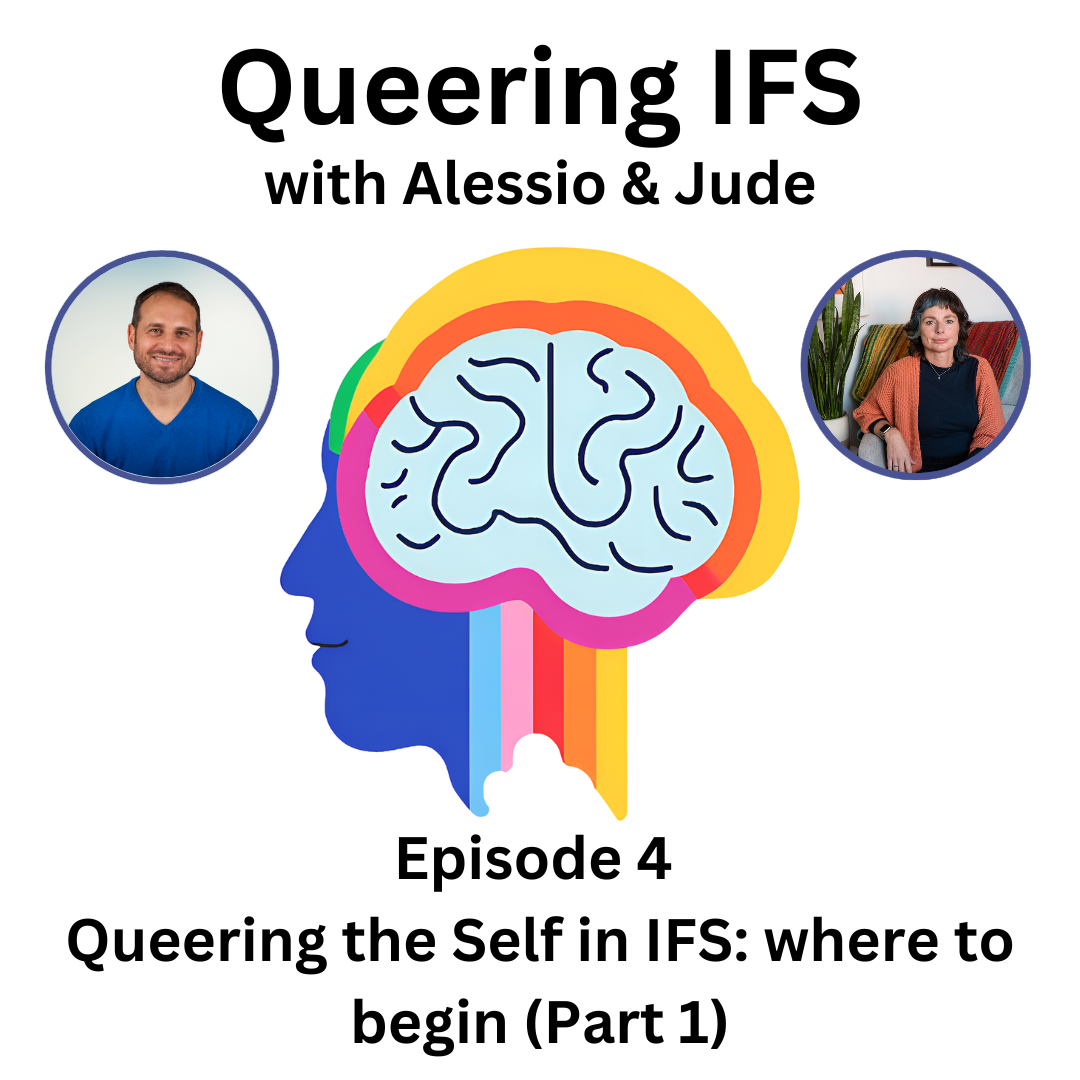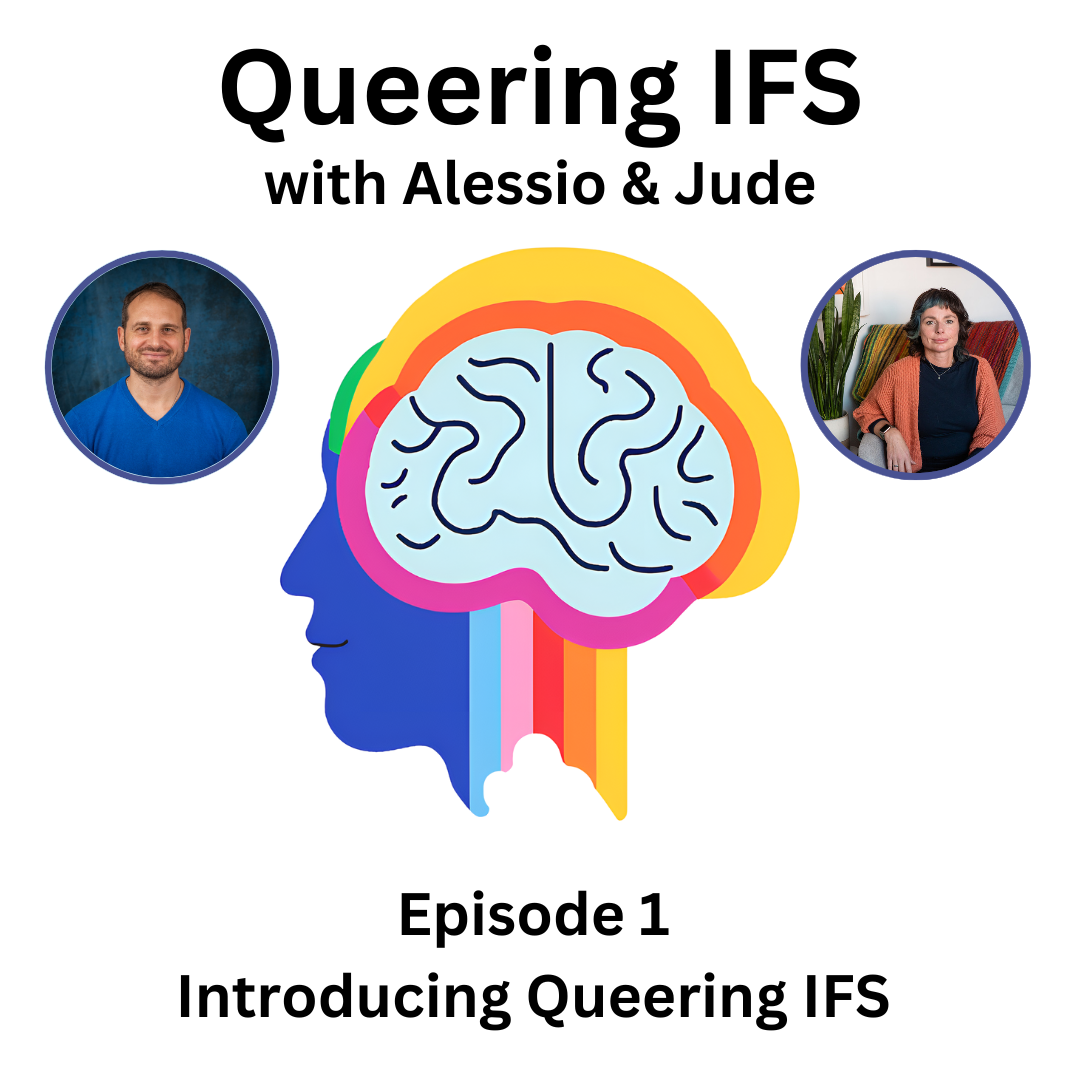Queering IFS Podcast Summary and Links
This episode delves into neurodivergent-affirming practices in IFS therapy, exploring how therapists can better accommodate clients’ diverse needs. Jude and Alessio share their experiences and offer practical advice on creating inclusive and supportive therapeutic spaces for neurodivergent individuals, emphasizing adaptability and client-centred approaches. Key discussion points include sensory considerations, flexible scheduling, and the importance of self-disclosure and open communication.
The podcast discusses the social and medical models of disability, highlighting their similarities and differences. The social model emphasises how societal barriers create disability, focusing on structural changes for inclusion rather than individual remediation. In contrast, the medical model views disability as an individual deficit requiring diagnosis and treatment. The speakers note that both models are, in a way, deficit-based, one highlighting societal failures and the other individual limitations…
The podcast explores shame, differentiating it from guilt. Shame is the belief that something is inherently wrong with oneself, leading to hiding and social withdrawal. It differs from guilt, which focuses on actions rather than identity.
Alessio expresses some dissatisfaction with existing frameworks and introduces the concept of “queering shame.”
The podcast opens with introductions, revealing the speakers’ diverse backgrounds and expertise in IFS therapy and LGBTQ+ issues.
The central theme revolves around the pervasive influence of the gender binary and its detrimental effects.
The discussion uses a compelling metaphor: a smoky bar where those conforming to the binary are smokers, comfortable in the toxic environment, while those outside the binary are non-smokers…
This episode begins with introductions by Alessio and Jude, who establish their backgrounds as IFS therapists with a focus on neurodiversity and queer clients.
They then introduce the core question: is the Self, in the IFS model, queer? They immediately acknowledge the complexity of this question…
The podcast discusses a significant gap in Internal Family Systems (IFS) therapy: the lack of open discussion regarding healthy sexual expression. Ali, a therapist specialising in IFS, argues that the field historically avoided discussing sexuality due to its roots in sex-negative cultural and religious norms.
Defining the Self in IFS
The conversation begins with an exploration of the Self within the Internal Family Systems (IFS) model. Alessio and Jude acknowledge the difficulty in providing a definitive explanation of the Self, highlighting the lack of a single, universally accepted definition within the IFS framework. They explain that a common misconception is the pursuit of a state of complete unblending from parts.
This episode delves into the complexities of pronouns within the context of IFS (Internal Family Systems) therapy, particularly for queer and neurodivergent individuals. Jude and Alessio discuss the importance of respecting client and parts pronouns, share personal journeys with pronoun usage, and offer practical guidance for therapists on navigating this sensitive topic with clients. The conversation highlights the fluidity of gender identity and the potential for misgendering to cause harm, emphasizing the need for curiosity and respect in therapeutic practice.
The hosts introduce the podcast and set the stage for a discussion on neurodiversity from an Internal Family Systems (IFS) perspective, highlighting the importance of understanding different cognitive functioning.
In this first video, Jude Carn and Alessio Rizzo, two Internal Family Systems (IFS) psychotherapists, introduce the topic of Queering IFS (Internal Family Systems) and use the lenses of queering, neuroqueering, queerness and neurodiversity to make IFS more accessible to marginalised identities, and to support therapists in being better allies, supporters and advocates for their diverse clients.














Alessio and Jude explore the intersection of Internal Family Systems (IFS) therapy and neurodivergence, as they ponder intriguing questions about the Self and neurodivergence.
This is the third episode in their exploration of Self-energy, queerness and neurodivergence. With reference to Nick Walker's pioneering work on Neuroqueering, they navigate the shifting cultural and historical contexts of neurodiversity, offering listeners an understanding of what it means to embrace cognitive differences within societal norms.
As we draw on the hardware-software analogy, where the body serves as hardware and the self and its parts as software, we delve into the nuanced relationship between neurocognitive functioning and personal identity. Referencing the perspectives of several different thinkers in the field, they challenge the scientific community's attempts to measure the intangible aspects of The Self. This conversation highlights the complexities of Self-energy as it weaves through gender identity, culture, ethnicity, and neurodivergence, raising questions about advocacy for neurodivergent selfhood.
Connect with us as we continue to foster a community engaging with neuroqueer themes through workshops and projects. Our shared journey is one of curiosity and openness, encouraging listeners to appreciate diverse perspectives and question binary paradigms.